Looking Up, 16-page English PDF Edition, Back Issues and Current Issue

|
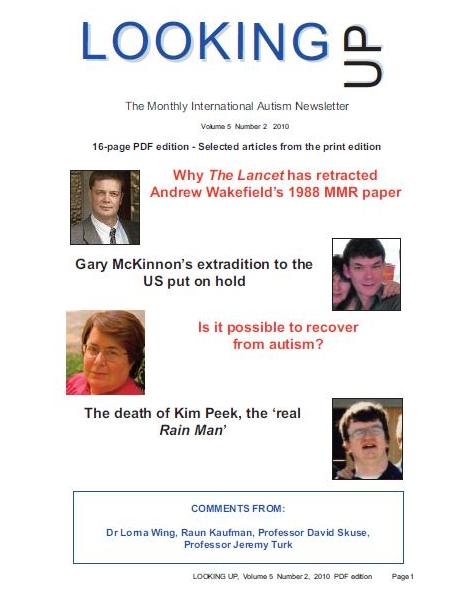
|
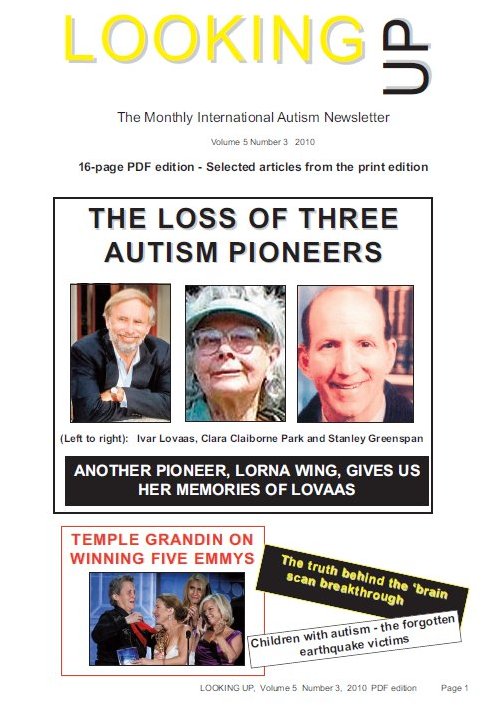
|
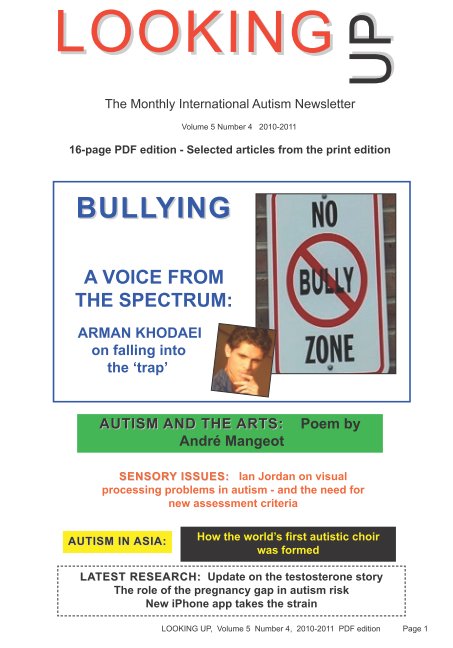
|
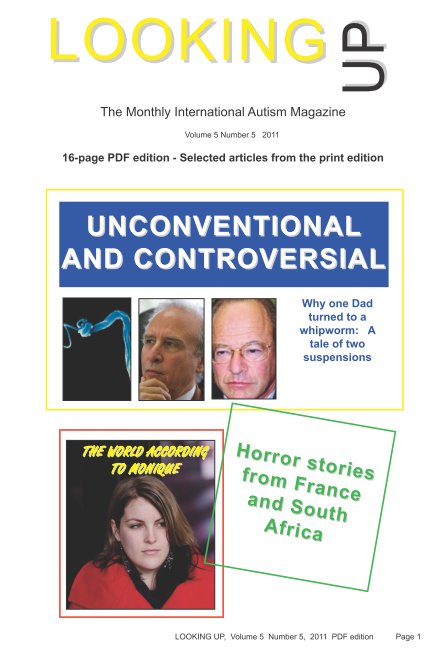
|
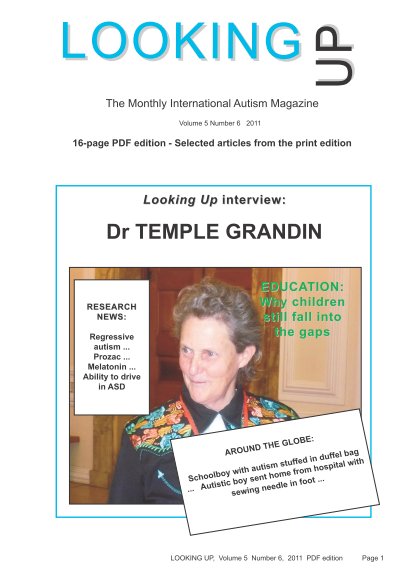
|
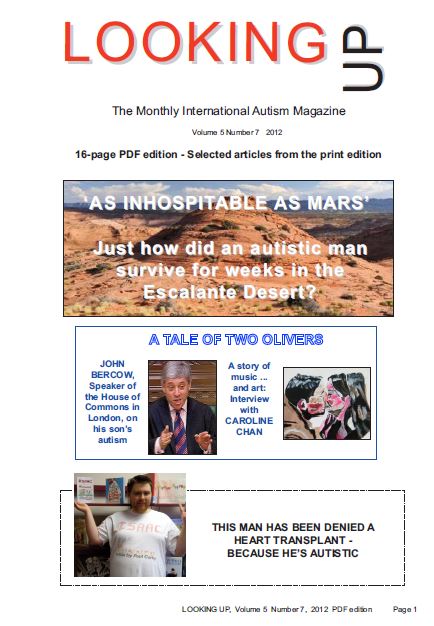
|
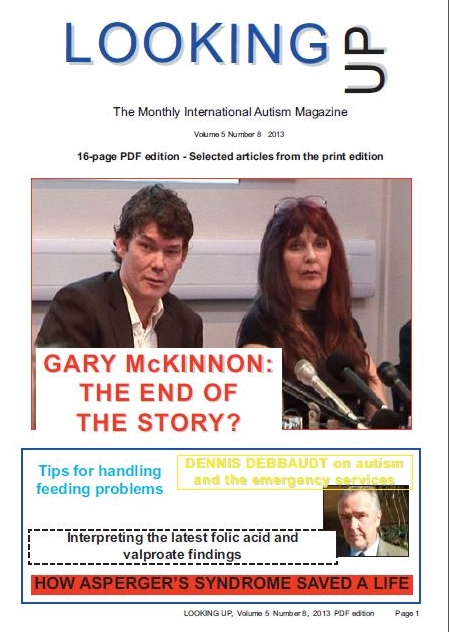
|
| Home page | Subscribe (print edition) | Selected articles | Our publications | Our mailing lists |
| PDF edition | Subscribe (PDF edition) | Back issue contents | Autism books | Contact us |
From Volume 5 Number 4 (print and PDF editions)
WASHINGTON, DC, USA: A new study may provide a clue as to why more men than women have autism. Sex hormones regulate a gene linked with the condition, making it more likely that males will accumulate testosterone in the dangerous amounts that some researchers believe may lead to autism.
The general consensus is that, for every female that has autism, there are four males - although, as we reported in the previous issue of Looking Up (see Vol 5 No 3, page 9) this figure may have to be revised if we acknowledge that girls are being under-diagnosed. In order to understand this sex bias, Dr Valerie Hu at the George Washington University Medical Centre in Washington DC and colleagues studied a gene implicated in autism called retinoic acid-related orphan receptor-alpha (RORA). This gene controls a molecule that switches many subsequent genes on and off.
Previous research has shown that RORA is important for the development of the cerebellum and that the brains of people with autism expressed less of it than normal. Mice that likewise express less RORA than normal display symptoms that resemble autism in humans, such as repetitive behaviours and deficits in spatial learning.
To find out how RORA is affected by hormones, Dr Hu’s team bathed human brain cells expressing the gene in either oestradiol – a form of the major female sex hormone, oestrogen – or the male sex hormone dihydrotestosterone (DHT), which is derived from testosterone. They found that oestradiol enhanced the gene’s expression, whereas DHT suppressed it.
The team also discovered that RORA regulates another gene which controls aromatase, an enzyme that converts testosterone to oestrogen. If RORA is under-expressed, then aromatase cannot function properly and testosterone will accumulate.
In a whole organism, this excess testosterone may in turn further repress the expression of RORA, making matters worse.
Elevated levels of testosterone in the womb are thought to contribute to the development of autism. However, if the RORA gene is faulty in a female foetus, it would be less susceptible to a build-up of testosterone because the foetus has higher levels of oestrogen to begin with. What is more, female sex hormones are likely to promote any RORA that is expressed, rather than further repress it.
“For a long time elevated foetal testosterone has been a proposed as risk factor for autism, but the problem is that there has been no molecular explanation,” says Dr Hu. “Now we have evidence for a really exacerbating situation. What we have identified is an inhibitory feedback loop. That is what makes this so fascinating.”
Dr Brett Abrahams, who studies autism at the Albert Einstein College of Medicine in New York, says the study is “very cool.” He says that the commonness of autism in males is one of the key and unexplored areas of research into the condition.
“Elaborating a means of exploring this question is really to [this team’s] credit. They have made an important contribution because, although there have been previous attempts to look at relationship between genes known to modulate sex differences and autism, not much has come out of that.”
Dr Joseph Buxbaum, of the Seaver Autism Center at the Mount Sinai School of Medicine in New York, is also impressed by the study, but cautions that there is still limited evidence for the “extreme male brain” hypothesis. Furthermore, he says, the nature of autism varies from person to person: “It is very unlikely there will be a single pathway.”

|

|

|

|

|

|

|

|
| Current 40-page print edition issue | |||||||||||||||
|---|---|---|---|---|---|---|---|---|---|---|---|---|---|---|---|

|
| ||||||||||||||
| PRINT EDITION BACK ISSUE CONTENTS AND FRONT COVERS | ||||||||||||||||||||||||||
|---|---|---|---|---|---|---|---|---|---|---|---|---|---|---|---|---|---|---|---|---|---|---|---|---|---|---|
| VOLUME 1, Number: | 1 | 2 | 3 | 4 | 5 | 6 | 7 | 8 | 9 | 10 | 11 | 12 | VOLUME 2, Number: | 1 | 2 | 3 | 4 | 5 | 6 | 7 | 8 | 9 | 10 | 11 | 12 | |
| VOLUME 3, Number: | 1 | 2 | 3 | 4 | 5 | 6 | 7 | 8 | 9 | 10 | 11 | 12 | VOLUME 4, Number: | 1 | 2 | 3 | 4 | 5 | 6 | 7 | 8 | 9 | 10 | 11 | 12 | |
| VOLUME 5, Number: | 1 | 2 | 3 | 4 | 5 | 6 | 7 | 8 | ||||||||||||||||||
| You can find our PDF EDITION CONTENTS AND COVERS on our PDF EDITION BACK ISSUES PAGE | ||||||||||||||||||||||||||
| Home page | Subscribe (print edition) | Selected articles | Our publications | Our mailing lists |
| PDF edition | Subscribe (PDF edition) | Back issue contents | Autism books | Contact us |